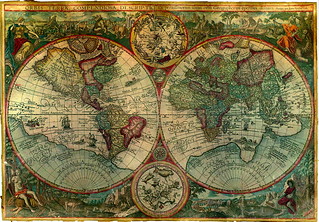The Origins Of European Thought On Inequality
Posts on Pierre Bourdieu and Symbolic Violence: link
Posts on The Dawn Of Everything: Link
Posts trying to cope with the absurd state of political discourse: link
In Chapter 2 of The Dawn Of Everything David Graeber and David Wengrow describe the context in which the standard history of societal development was developed. The story is usually traced to a 1754 essay by Jean-Jacques Rousseau, Discourse on the Origin and the Foundation of Inequality Among Mankind. The essay was entered into “… a national essay competition on the question: ‘what is the origin of inequality among men, and is it authorized by natural law?’” P. 28. How did we get to this question in France, a country where the very idea of inequality threatened the entire social order?
The authors give a short intellectual history of Europe. In the Dark Ages the continent was cut off from global trade and global intellectual discourse. In the Middle Ages, Arab scholars re-introduced Aristotle to Europe. Gradually other Greek and Roman writers were recovered and studied. European scholars, mostly clerics, began to construct an intellectual tradition.
As an aside, the Europeans don’t seem to have gotten the full benefit of the scholarship of Arab and other thinkers, which was quite advanced by that time. They weren’t bound to those traditions as dogma, but were able to read and study them fairly neutrally. European clerical scholars mostly tried to adapt the ancients into a more principled Christianity. It’s not even slightly surprising that their early thinking reinforced existing social structures. As an example, consider the divine right of kings. See the correction at the end of this post.
Back to the text. There is nothing about equality in the entire pre-Renaissance system of thought.
Ranks and hierarchies were assumed to have existed from the very beginning. Even in the Garden of Eden, as the thirteenth-century philosopher Thomas Aquinas observed, Adam clearly outranked Eve. ‘Social equality’ – and therefore, its opposite, inequality – simply did not exist as a concept. A recent survey of medieval literature by two Italian scholars in fact finds no evidence that the Latin terms aequalitas or inaequalitas or their English, French, Spanish, German and Italian cognates were used to describe social relations at all before the time of Columbus. P. 32.
The first discussions of equality arose in the development of the theory of Natural Rights. This theory evolved to justify the European domination of the people they found when they invaded the Americas and other lands beginning in 1492. Natural Right theory tries to identify the rights which inhere in people just because they are human beings, and even though they are living in a state of nature, completely unaware of Christianity. They concluded that you could invade as long as you didn’t treat them too badly, whatever that means.
Natural Rights discourse moves early societies away from the Garden of Eden story, opening the way to secular theories. European thinkers proposed ideas about what the original people might have been like. One common conception was that societies in the state of nature were free and equal. In contrast, we get Thomas Hobbes who argued that in the state of nature there was a war of all against all, only salvaged by the arrival of the powerful state.* The authors then describe some aspects of the term equality. For example, the Christian religion teaches a form of equality. All of us are equal in relationship to the Almighty. There is nothing much about freedom in the discourse of that time.
What we’re going to suggest is that American intellectuals – we are using the term ‘American’ as it was used at the time, to refer to indigenous inhabitants of the Western Hemisphere; and ‘intellectual’ to refer to anyone in the habit of arguing about abstract ideas – actually played a role in this conceptual revolution. P. 35.
From the beginning of the French invasion of North America, missionaries, soldiers, and travelers lived among the Americans. They learned eaah other’s languages, and talked about everything humans talk about. Of course that didn’t stop the rape, torture and murder. Many of these Europeans wrote reports and books, and gave lectures, on what they heard. As a result we have first-hand knowledge of the way the Americans perceived the French as well as the way the French perceived the Americans. That story fills out the Chapter. I’ll take up some of these fascinating dialogs in my next post. In the meantime, here are a pair of quotes that give a good taste of the Indigenous Critique of the invaders.
1.
Father Pierre Biard, for example, was a former theology professor assigned in 1608 to evangelize the Algonkian-speaking Mi’kmaq in Nova Scotia, who had lived for some time next to a French fort. Biard did not think much of the Mi’kmaq, but reported that the feeling was mutual: ‘They consider themselves better than the French: “For,” they say, “you are always fighting and quarrelling among yourselves; we live peaceably. You are envious and are all the time slandering each other; you are thieves and deceivers; you are covetous, and are neither generous nor kind; as for us, if we have a morsel of bread we share it with our neighbour.” They are saying these and like things continually.’ What seemed to irritate Biard the most was that the Mi’kmaq would constantly assert that they were, as a result, ‘richer’ than the French. The French had more material possessions, the Mi’kmaq conceded; but they had other, greater assets: ease, comfort and time. P. 38-9, fn omitted.
2.
[One writer] was surprised and impressed by his hosts’ eloquence and powers of reasoned argument, skills honed by near-daily public discussions of communal affairs; his hosts, in contrast, when they did get to see a group of Frenchmen gathered together, often remarked on the way they seemed to be constantly scrambling over each other and cutting each other off in conversation, employing weak arguments, and overall (or so the subtext seemed to be) not showing themselves to be particularly bright. People who tried to grab the stage, denying others the means to present their arguments, were acting in much the same way as those who grabbed the material means of subsistence and refused to share it; it is hard to avoid the impression that Americans saw the French as existing in a kind of Hobbesian state of ‘war of all against all’. P. 39.
Discussion
1. Why have I never heard about these fascinating discussions between the Americans and the European invaders? I had a pretty good education and I’m reasonably well read, and I never knew about it, did not know there were contemporaneous records, and didn’t realize that those records were commonly discussed among French bourgeoise.
2. What did the other peoples of the Americas, Africa, India, and China think of the invader? Are there similar records? These people have been muted, turned into something less than humans to use Arendt’s phrase. They spoke for themselves, but we of today don’t know them, their thinking, their understanding of their lives and the world. We are weakened by this loss.
3. This disappearance of whole cultures is genuine violence towards the people and cultures wrecked by the invading Europeans. But it’s also symbolic violence towards broader publics. Our discourse, our ability to understand the way things are or could be, is robbed of a deeply needed range of alternatives. We are herded into channels of thought chosen by those who know what others thought and who for reasons of their own bury not just the bodies but the thinking of our fellow human beings.
History may be written by the victors, but the victors haven’t destroyed all the contemporaneous records. I hope there are scholars and volunteers looking for it.
=====
* Hobbes wrote Leviathan during the bloody and shocking English Civil War, which must have influenced his theory that
//… during the time men live without a common Power to keep them all in awe, they are in that condition which is called Warre; and such a warre, as is of every man, against every man. …
…
… In such condition, there is no place for Industry; because the fruit thereof is uncertain; and consequently no Culture of the Earth; no Navigation, nor use of the commodities that may be imported by Sea; no commodious Building; no Instruments of moving, and removing such things as require much force; no Knowledge of the face of the Earth; no account of Time; no Arts; no Letters; no Society; and which is worst of all, continuall feare, and danger of violent death; And the life of man, solitary, poore, nasty, brutish, and short.//
Leviathan, Ch. XIII. I looked this up to see for myself; I haven’t read Leviathan and won’t.
—————-
Correction. I wrote that it seemed that European scholars did not get the full benefit of global thought when Aristotle was re-introduced by Arab scholars. I should have checked. Of course my education didn’t include anything about the influence of Arab thought on the thinking of Medieval scholars. According to The Internet Encyclopedia Of Philosophy, the brilliant Arab polymath Ibn Sina, known to us as Avicenna, influenced such scholars as Albertus Magnus and Thomas Aquinas. Ibn Sina’s work on Metaphysics was banned in Paris in 1210. This is just another example of the Euro-centrism of my education, and one more thing I have to relearn.


